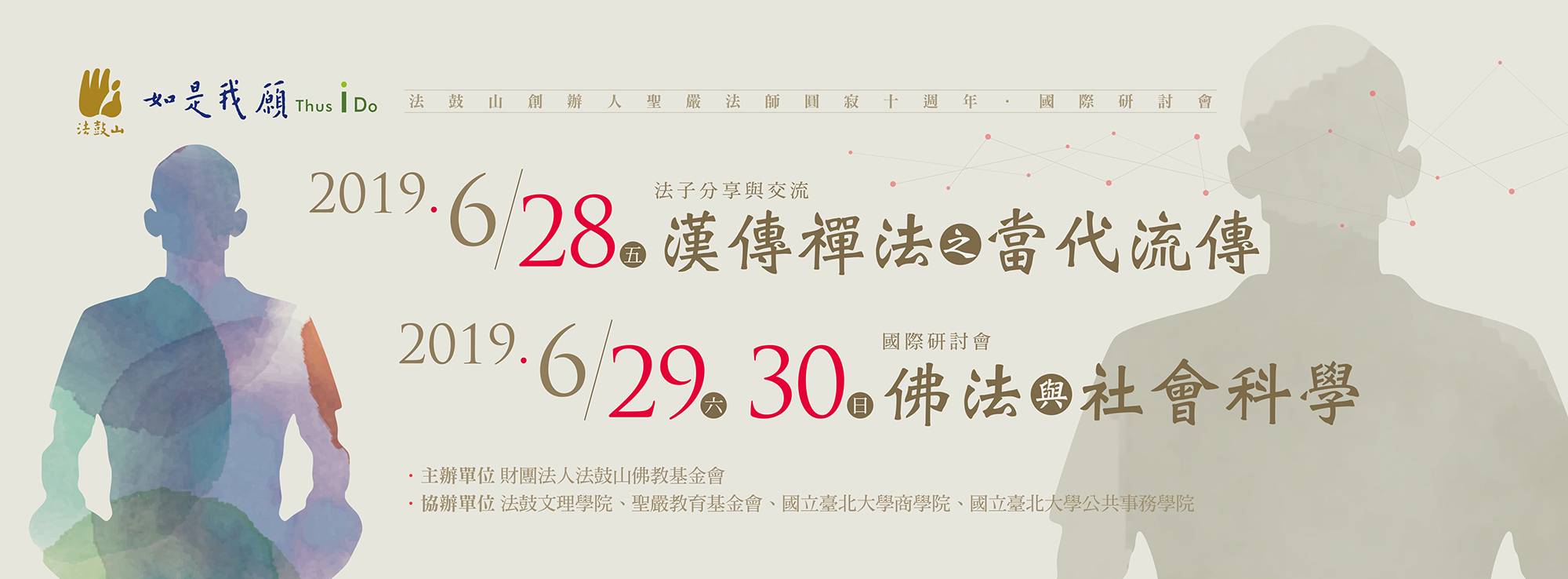2019 International Conference on Buddhism and Social Science
Saturday Morning June 29
Buddhism and Social Science Conference Manual
Venue: Dharma Drum Mountain International Conference Hall
| 08:30-09:00 | Registration |
|---|---|
| 09:00-09:10 | Opening Film |
| 09:10-09:20 | Abbot President Ven. Guo Hui Opening Remarks |
| 09:20-09:30 | Ven. Huimin Remarks |
| 09:30-10:40 | Keynote Speech (1):Economics Moderator and Respondent:Prof. Tetsunori Koizumi Speaker:Prof. Joel Magnuson Title:Mindful Economics and the Countdown to 2030 Abstract *English-Chinese simultaneous translation will be provided |
| 10:40-11:00 | Tea Break |
| 11:00-12:10 | Keynote Speech (2):Public Governance and Management Moderator and Respondent:Ven. Guo Dong Speaker:Prof. Frances Berry Title:Applying Buddhist Principles to Managing People in the Public, Private and Nonprofit Workplaces Abstract *English-Chinese simultaneous translation will be provided |
| 12:10-13:30 | Lunch |
Saturday Afternoon June 29
Vanue: Dharma Drum Institute of Liberal Arts
Panel1: Economics
| GC102 (English) | GC105 (Chinese) | |
|---|---|---|
| 13:30-15:00 | Moderator:Yuan-Ho Hsu 1.Sense of Interdependence and the Altruistic behavior (TzyyJan Lai, Ching-Ying Yu) Abstract Respondent: Weijen Teng 2.Buddhadarma and Sustainable Development: An Integrated Framework of Analysis (Ching-yi Chiang) Abstract Respondent: Kuen-Shiou Yang 3.An Exploration of Corporate Social Responsibility and Gamification Paired with Virtual Reality Stimulating Empathy and Enhancing Employee Engagement (Ren-An Lo, Ching-Ying Yu) Abstract Respondent: Helen K. H. Liu |
Moderator:Kao charng 1.Some Views on Yu Ying-shih’s Religious Ethics and the Merchant Spirit in the Recent Chinese History: a Discussion on the Perspective of Turning Buddhism into a Worldly-engaged Religion (Tsung-wu Ho) Respondent:Steve Waicho Tsui 2.Buddhist Economics: Theoretical Foundation and Framework(Pin Huang Chou) Abstract Respondent:Chien-Sen Huang |
| 15:00-15:20 | Tea Break | |
| 15:20-16:50 | GC105 (Chinese) | |
| Moderator:Tso-Kwei Peng 1.Spiritual Environmental Economy and Inclusive Political and Economic Institution (Ji Chou) Abstract Respondent:Tsung-wu Ho) 2.The Basic View of Buddhist Economy Wealth Thinking —the Research on the Viewpoints of Master Sheng Yen (Weiling Cai, Chien-Sen Huang) Abstract Respondent:Kao charng 3.A Preliminary Study on the Influence of the Fivefold Spiritual Renaissance Campaign on Economic Behavior (Chun-Kuei Hsieh, Mei-Huei Yen) Abstract Respondent:Pin Huang Chou |
||
Panel 2: Public Governance and Management
| GC101 (Chinese) | |
|---|---|
| 13:30-15:00 | Moderator:C. James Huang 1.A Study on the Impact of Mindfulness on Emotional Balance (Chin-chih Chu) Abstract Respondent:Ven. Fa-yuan 2.Serving the Citizen with the ‘Original Face’: Some Implications for Civil Service from Buddha’s Wisdom (Yi-feng Huang) Abstract Respondent:C. James Huang 3.A Thorough Reflection on the Core Value of Master Sheng Yen’s Leadership and Heritage from the Perspective of Professional Ethics (Kai-Hua Shih) Respondent:Yi-feng Huang 4.Sharing the Dharma and Building a Pure Land on Earth Based on the Buddha’s Mind: Striving Toward a Great Peaceful World by Constructing a Harmonious Society with the Philosophy of Public Policy (Chih-cheng Yang) Respondent:Chung Yung Hsiung |
| 15:00-15:20 | Tea Break |
| GC101 (Chinese) | |
| 15:20-16:50 | Moderator:Chin-chih Chu 1.The Management Model of “Leadership in Accord with Dependent Origination”: The Buddhist Teaching and Tthe Management of Leadership (Ernest Ng) Respondent:Chung Yung Hsiung 2.The Abbots’ Leadership at the Chan Temples in Song Dynasty: On the Character Comments in Treasured Instructions of Chan Temples (Wen-bi Xu) Abstract Respondent:Yi-feng Huang 3.Practicing Bodhisattva Actions in the Buddhist Teaching and Developing Advantages in the Workplace (Vincent Tai) Respondent:Chang Chan |
Panel 3: Finance, Accountancy, and Business Administration
| GC103 (Chinese) | GC106 (Chinese) | ||
|---|---|---|---|
| 13:30-15:00 | Moderator:Ting-Ming Chen 1.Analysis of Social Return on Investment of the Project of Social Care Development in Urban Indigenous of Zhi-Shan Foundation Taiwan (Ting-Ming Chen, Yu-Wen Hsu) Abstract Respondent:Chihua Li 2.Han Transmitted Chan Buddhism and Modern Business Ethics: A Mutual Fit between Dharma Drum Mountain’s Protecting the Spiritual Environment and Business Ethics Diffusion (Chen-Fong Wu) Abstract Respondent:Ting-Ming Chen 3.Protecting the Spiritual Environment, Corporate Social Responsibility and the Determinants of Disclosure of Sustainable Development Goals (Chihua Li) Abstract Respondent:Chen-Fong Wu |
Moderator:Hsiang-Lin Chih 1.The Development of Social Enterprises: A Perspective of Scalability (Cheng-Cheng Wu) Abstract Respondent:Chun-Kuei Hsieh 2.An Introduction to the Application of Buddhist Philosophy in Business Administration (Jia-Song Huang) Respondent:Chang Chan |
|
| 15:00-15:20 | Tea Break | ||
| GC103(Chinese) | |||
| 15:20-16:50 | Moderator:Xiaowu Zhu 1.Building Entrepreneurship: The Role of Religion (Xiaowu Zhu) Abstract Respondent︰Yi-Nung Peng 2.The Diamond Sutra’s Application in Business Ethics – Analyzing Key Qualities of Business Managers(Ying‐Jun Lin) Abstract Respondent:Shin-hwa Liu 3.The Impact of Mindfulness on Mood Spillover between Family and Work settings: An Exploratory Study (Yi-Nung Peng、Sz-Yu Chen) Abstract Respondent:Xiaowu Zhu |
||
Panel 4: Sociology
| GC001 (Chinese) | GC002 (Chinese) | GC003 (Chinese) | |
|---|---|---|---|
| 13:30-15:00 | Moderator:Serena Lin 1.Master Sheng Yen’s Thoughts and Realizations in terms of Sociology of Religion (Zhiyong Wen) Respondent:Yu-chen Lee 2.The Fusion of “Equality” under the Dharma and the Laws: from Master Sheng-Yen’s Interpretation of Buddhism (Li-Ya Chu) Abstract Respondent:Yu-chen Lee 3.A Preliminary Exploration of the Space Practice of the University Campus of the Dharma Drum Institute of Liberal Arts in the Venerable Master Sheng Yen ‘s DDM World Center for Buddhist Education (Hann-Jen Tseng) Abstract Respondent:Yu-chen Lee |
Moderator:Ven. Guojing 1.Aesthetics of Silent Illumination (Wu-Hsiung Chen) Abstract Respondent:Ven. GuoXing 2.Practicing Chan in Daily Life—A Study of Curriculum Development and Inquiry in Education for Environmental Protection Team of DDM Volunteers (Ya-Wen Chang) Abstract Respondent:Ven. GuoXing 3.Chan Buddhism, Governance, and Subjectivization–The Formation of Monastic Subject in a Modern Chan Monastery (Ven. Changshen) Abstract Respondent:Ven. GuoXing |
Moderator:Ji Zhe 1.The Process of Modernization of Buddhism in Chinese Communities in the 1960s and its Analysis in Terms of Social Science (Ming-chien Hsu) Respondent:Ji Zhe 2.The Changes of Humanistic Buddhism Advocated by Taixu and Juzan (Xue Yu) Abstract Respondent:Ji Zhe 3.Public Space Participatory Construction of Contemporary Buddhist Temples in Aging Society (Yiwei Pan; Jiping Wang) Abstract Respondent:Chih-Yao Chang |
| 15:00-15:20 | Tea Break | ||
| GC002 (Chinese) | GC102 (English) | |
|---|---|---|
| 15:20-16:50 | Moderator:Mei-hua Chen 1.Buddhadasa Bhikkhu’s Buddhist Socialism: Interpretations of the Term from Political Science to Moral Economy Communities (Lawrence Y.K. Lau) Respondent:Chih-Yao Chang 2.A Theoretical Basis for the Realization of Sociology of Religion: Inspired by Dharma Drum Mountain’s Initiative and Agency to “Build a Pure Land on Earth” (Meiya Chang) Respondent:Mei-hua Chen 3.Karma, Social Justice and Lessons from Anti-Oppressive Practice for Buddhist (WeiWu Tan) Abstract Respondent:Chih-Yao Chang |
Moderator:Weijen Teng 1.Taixu and the Importation of Utopian Literature in Twentieth Century China (Charles Jones) Abstract Respondent:Jinhua Chen 2.Promoting Chinese Buddhism as social reform in the global religious context: The education approaches of Master Sheng Yen (Ngar-sze Lau) Abstract Respondent:Jinhua Chen |

